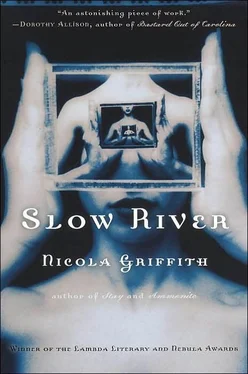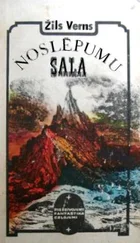Very sensible. And then she was walking me somewhere while I rambled on about Paolo and his limbs and how he had tried to kill himself. I found we were in the breakroom. She made me wash my hands, then gave me a towel. Neither of us spoke. The eerie sense of deja vu hit me, and I laughed.
“I wonder if Paolo felt like this when I was taking away his razor,” I explained. “As though he was about five years old and being humored by a wise, kind person.” And then I felt embarrassed.
She didn’t launch into a denial. Of course she was humoring me. That’s what you did with someone in distress. You patted them on the head, told them everything was fine, and waited for them to get back up to speed with reality.
I sighed. “We should get back.”
Magyar looked at her watch. “Are you up to date in your readings for Hepple? Good. Then you may as well stay here. We break in ten minutes.”
She seemed relieved to get away.
* * *
Lore woke up. It was five in the morning. She pulled a blanket around her shoulders and stumbled out of bed.
Spanner was at the workbench. Lore watched as she picked up a pair of delicate tweezers and opened up a PIDA, touched something inside, then inserted it into her box. She flipped it shut, hummed to herself at the readout, tapped a few keys.
“You’re very good at that,” Lore said.
“I know.” Spanner turned. “What gets you out of bed at this hour?”
“Just wondered what you were up to.” Spanner went back to her screen. “You know, you could get a job doing that.”
Spanner turned again, smiling. “Now, why would I need a job?”
The first few times she had gone to the Polar Bear, Lore had not realized that Spanner was doing business. Spanner would share a drink and a few words, there would be a slap on the back or a nod, and occasionally something would change hands—illegal PIDAs, temporary debit blanks, information. They would go home and Spanner would unload her pockets. The next day she would spend hours at her screens, matching magnetic codes, stripping information; copying the corporate electromagnetic signatures on a stolen debit card, transferring them to a blank; or simply calling people and telling them she had what they wanted. Hyn and Zimmer figured a great deal in the blanks transactions—“They’re more or less untraceable, dear”—but it was Billy who disturbed Lore the most. Every week or so he would cruise by, sometimes with Ann, usually without, and have a quiet word with Spanner, usually when they were at the bar and out of everyone else’s earshot. Lore thought she heard them talking about chickens, but she tried not to listen.
It was around February that Lore noticed a difference in Spanner’s bar dealings. She seemed to be talking more, and more urgently; there was more head shaking and less back-slapping, fewer things changing hands. And then one day Lore realized she had not seen Hyn or Zimmer for a while.
“What’s going on?” she asked Spanner.
“Business is getting tight.”
“Anything to worry about?”
“Not yet. There are always other ways to make money.”
Lore did not want to ask about that. “Where have Hyn and Zimmer been lately?”
“Who?” Spanner laughed. “They’re a couple of cautious old foxes. Whenever the police are cracking down they disappear for a while.”
“Shouldn’t you be more careful?”
“Oh, I’m too smart for the police.”
Nevertheless, Lore noticed that Spanner went out later and for shorter periods, and once she lay low for forty-eight hours straight, wouldn’t let Lore answer the screen at all. But then the next day she went out and came back grinning.
“Close your eyes.” Lore did. “Now open them and look on the bed.”
It was a Hammex 20. Lore picked it up, ran her hands over its familiar black curves. “These aren’t cheap.” She flicked the power switch, peered through the viewfinder. The drive hummed smoothly.
“Do you like it?”
“It seems in good condition.” She put it back on the bed and looked at it for a while, remembering Ratnapida, her first pictures of goldfish swimming slowly through crystal and shadowed water. She turned to face Spanner. “How can we afford it if business is bad?”
Spanner shrugged.
Lore thought of Billy, his mean eyes and fast mouth. “Are we in debt?”
“No.”
“Then how did we afford it?”
“I thought you’d like it.” Spanner sounded irritated.
“I do, I just don’t know how we can afford it.”
“Well, we can.”
Lore thought of Spanner’s disappearances, how tense she had been when she came back. The skin on the back of her neck felt tight. “How?”
“Does it matter?”
It did, but Lore did not have the courage to push any further. She was not sure she really wanted to know how Spanner had come up with the money, who she was blackmailing about what. Or what else she might be doing. Spanner, as though sensing her acquiescence, smiled and slid an arm around Lore’s waist.
“Do you like it? Really?”
Lore forced herself to smile. “You got exactly the right kind. They have the best lenses.” And despite herself, she was touched. The old-fashioned Hammexes were not easy to find these days. She imagined Spanner going from one dealer to another, reading the trade bulletins, bargaining. How she got the money, who had suffered, was none of Lore’s business. “Let’s find a disk and take some pictures.”
It was spring and Lore had the windows open. The soft breeze that blew across her editing desk smelled of new green. There were tiny buds on the branches outside—all the branches except one. She wondered how that had happened, why one branch would die while the others thrived. She supposed it just happened. Parts of things died. Nature. The door banged open. She turned, smiling, expecting Spanner to tell her they had made a lot of money.
Spanner threw a bag on the couch. “They’re not selling.”
“What?” Lore’s smile faded.
“The films aren’t selling.”
“You’ve been making a lot of copies.”
“Oh, I can move the units, but not for enough money. Not as much as we need. People tell me they’re tired of the same bodies in different situations.”
Lore looked at the frame lit on the screen. She did good work, but her library was so limited. “I need some live action. Or a bigger library.”
Spanner nodded and dropped onto the couch.
“You want me to stop?”
“No,” Spanner said. “Let me think about it awhile.”
Two days later, she disappeared for more than twenty-four hours. When she came back, she looked exhausted, but she was grinning.
“I’ve got something special.” She held up a vial full of some clear, oily liquid.
“What is it?”
“You’ll see. Come here.” Spanner dipped a fingertip into the neck of the bottle, rubbed the finger along Lore’s throat. She did the same for herself. “Just a little. It’s very concentrated.”
“It’s a drug? What kind?”
“You’ll see,” she said again, and her voice was low and multilayered, her eyes dark. Lore wanted to trace Spanner’s cheekbones with her fingertips, run her palm across her shoulders, reach down into her clothes, touch her, feel her moving under her hands. She wanted it urgently. She ached.
An aphrodisiac, then, a pheromone, but more powerful than any she had heard of, legal or illegal. This was unstoppable. Spanner began to unbutton her dress. Lore moaned.
“Anything you like, baby, anything.”
There were about thirty people in the big room, spilling out into the kitchen, onto the steps. Lore introduced people, though most of them knew each other better than she did. Everyone was drinking very steadily. She brought out snacks, made sure the music never faltered. She avoided Billy, who just stood in the corner and watched everything with his small, flat eyes that reminded her of all the things she tried not to think about.
Читать дальше












